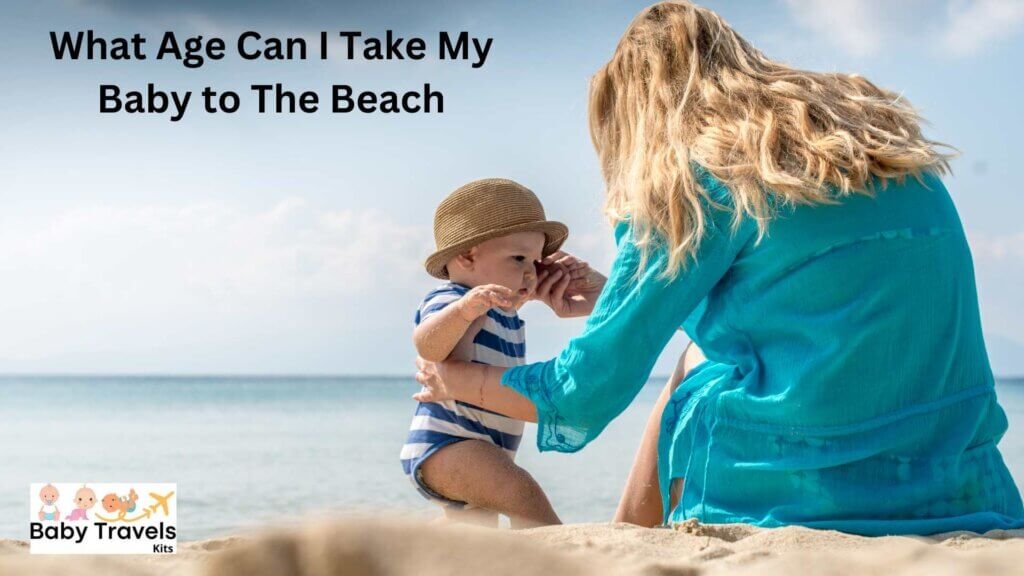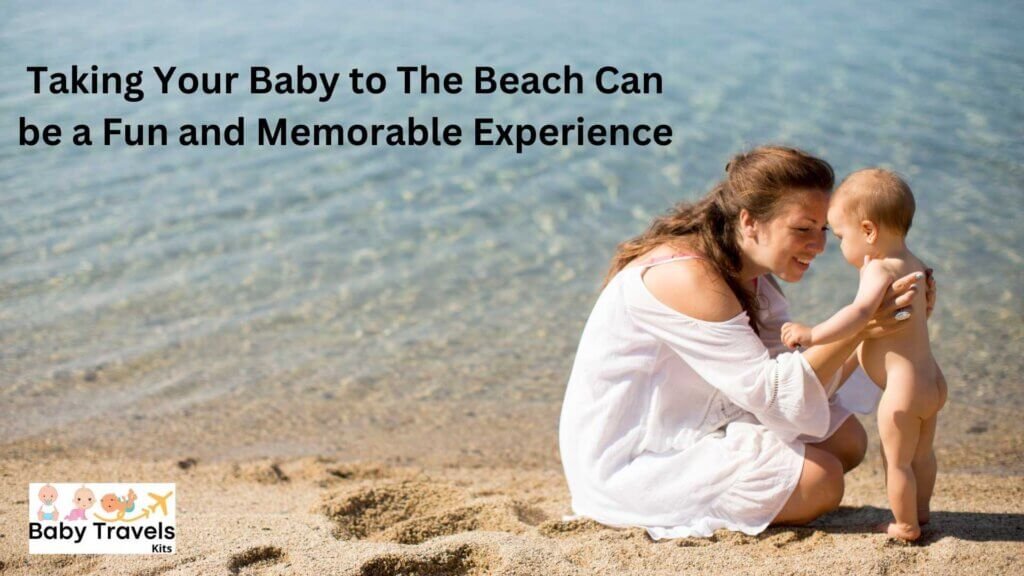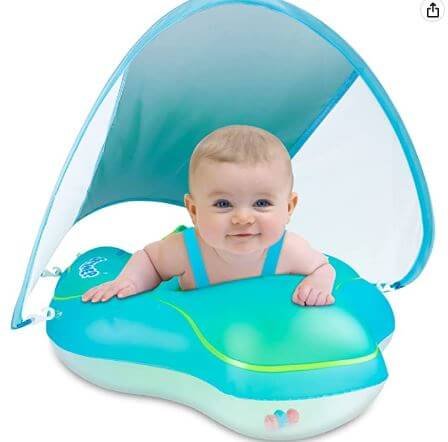As a new parent, you may be looking forward to taking your little one to the beach, but you may be unsure about what age is safe and appropriate.

Infants below 12 months of age should not remain in a pool for over 30 minutes. While it is permissible to bring your baby to a river, lake, or ocean from the age of 2 months, it is critical to ensure that they do not become cold. Pick a location with warm and clear water.
We will provide you with useful information on the ideal age for your baby to visit the beach, safety tips to keep in mind, and ways to make your trip enjoyable for both you and your baby.
Benefits of Taking Babies to the Beach:
Taking babies to the beach can be a wonderful experience for both parents and infants. Here are some of the benefits:
- Sensory Stimulation: The beach offers a rich sensory environment with the feel of sand, the sound of waves, and the sight of seagulls. This sensory stimulation can be fascinating and educational for infants.
- Vitamin D Exposure: Sunlight at the beach provides an excellent source of vitamin D, which is crucial for healthy bone development in babies.
- Bonding Time: A day at the beach provides quality bonding time for parents and their babies. Playing together in the sand or taking a dip in the water can strengthen the parent-child connection.
- Nature Exploration: Babies can explore the natural world, observing seashells, pebbles, and small creatures. This exposure to nature fosters an early appreciation for the environment.
- Physical Development: Crawling or toddling on the beach’s uneven surface can aid in the development of motor skills and muscle strength.
- Relaxation: The beach’s soothing sounds and serene environment can promote relaxation and even better sleep for babies.
Age Considerations for Taking Babies to the Beach:
While taking babies to the beach can be a positive experience, it’s essential to consider their age and developmental stage:
- Newborns: Babies under six months are more susceptible to temperature changes and sunburn. It’s crucial to keep them well-shaded and protected from direct sunlight.
- 6 to 12 Months: Babies in this age range may be more mobile and interested in exploring. Ensure they are well-supervised and have a shady spot to rest.
- 12 Months and Older: Older babies can enjoy the beach more actively. They may enjoy playing in the sand or shallow water with close parental supervision.
Developmental Milestones:
Consider your baby’s developmental milestones when planning a beach trip:
- Crawling or Walking: Babies who are crawling or walking may enjoy exploring the sand and water, but they also require constant supervision to ensure their safety.
- Curiosity: Babies become increasingly curious as they grow. They may want to touch and taste the sand, so be prepared for messy hands.
- Social Interaction: At around six months and older, babies may begin to show interest in other children at the beach. Social interactions can be beneficial for their development.
Health and Safety Considerations:
To ensure a safe beach outing with your baby:
- Sun Protection: Protect your baby from the sun with sunscreen (for babies over six months), sun hats, and lightweight, long-sleeved clothing. Use a beach umbrella or pop-up tent for shade.
- Hydration: Keep your baby hydrated, especially in hot weather. Offer breast milk or formula frequently and ensure they drink enough water if they’ve started solids.
- Swim Safety: If your baby is going in the water, use a baby flotation device designed for their age and size. Always hold onto your baby when near the water.
- Sand Safety: Be mindful of sand, which can be a choking hazard for small babies. Avoid allowing them to put sand in their mouths.
- First Aid Kit: Bring a basic first aid kit for any minor injuries, including cuts or scrapes.
Summer Weather Concerns:
During the summer season, consider these additional factors:
- Heat: Watch for signs of overheating in your baby, such as flushed skin, excessive sweating, or fussiness. Keep them cool with shade and hydration.
- Sunburn: Protect your baby’s delicate skin from sunburn by using sunscreen, hats, and shade. Avoid sun exposure during peak hours, typically between 10 a.m. and 4 p.m.
- Dehydration: Babies can become dehydrated quickly in hot weather. Be vigilant about providing fluids, and look for signs of dehydration, including dry mouth, fewer wet diapers, or lethargy.
In summary, taking your baby to the beach can offer numerous benefits for their sensory development and your bonding experiences. However, it’s crucial to consider their age, developmental stage, health, and safety needs, especially in hot summer weather, to ensure a safe and enjoyable outing for the whole family.
Preparing Your Baby for The Beach Trip
Preparing your baby for a beach trip involves careful planning to ensure their comfort and safety. Here’s a step-by-step guide to get you ready:
Timing:
- Choose the Right Time: Opt for a time when the weather is mild, typically in the morning or late afternoon, to avoid peak heat and sun exposure. Avoid going to the beach during the hottest part of the day, which is usually between 10 a.m. and 4 p.m.
- Consider Nap Times: Plan your trip around your baby’s nap schedule to avoid disrupting their sleep patterns.
- Check Tide and Weather: Check tide schedules and weather forecasts to ensure safe and pleasant conditions at the beach.
Clothing and Sun Protection Options for Babies:
- Sun Hats: Dress your baby in a wide-brimmed sun hat that shades their face, neck, and ears. Look for hats made of lightweight, breathable materials.
- Swimwear: Opt for swimwear designed for babies with built-in UV protection. These suits cover more skin and provide additional sun protection.
- Cover-Ups: Consider lightweight, long-sleeved cover-ups for added sun protection. They can also help protect against wind and cooler temperatures.
- Sunglasses: If your baby will tolerate them, choose baby-sized sunglasses that provide UV protection.
- Sunscreen: For babies over six months old, use a baby-specific sunscreen with a high SPF rating. Apply it to exposed skin, even on cloudy days, and reapply as directed on the label.
- Shoes: Beach-friendly, soft-soled shoes or water shoes can protect your baby’s feet from hot sand and sharp shells.
- Swim Diapers: If your baby isn’t toilet-trained yet, use swim diapers designed to contain accidents in the water.
- Shade: Bring a portable beach umbrella or pop-up tent to provide a shaded area for your baby to rest and play.
Feeding and Hydration Needs at the Beach:
- Breastfeeding: If you’re breastfeeding, you have the advantage of on-demand feeding. Breast milk is an excellent choice for hydration and nutrition.
- Bottle-Feeding: For formula-fed babies, prepare bottles in advance with the correct amount of formula and bring extra in a cooler bag. Use pre-measured formula dispensers to simplify bottle preparation.
- Water: If your baby is over six months old and has started solids, offer small sips of water in addition to breast milk or formula to keep them hydrated.
- Solid Foods: If your baby is eating solids, pack easy-to-eat, non-perishable snacks, such as cut-up fruits, baby cereal, or baby food pouches. Avoid perishable items that can spoil in the heat.
- Cooler Bag: Use a well-insulated cooler bag to store bottles, baby food, and perishable snacks. Ice packs can help maintain a safe temperature.
- Feeding Essentials: Bring bibs, utensils, and feeding supplies as needed for your baby’s meals.
- Hydration Vigilance: Keep a close eye on your baby’s hydration. Look for signs of thirst and offer fluids frequently, especially on hot days.
- Comfort: Create a comfortable feeding and resting area in the shade. Consider a portable baby beach chair or a soft, lightweight blanket for your baby to sit or lie on.
- First Aid: Have a basic first aid kit on hand in case of minor injuries, such as cuts or scrapes.
By taking these steps to prepare your baby for the beach trip, you can ensure that they have a safe and enjoyable experience. Prioritize sun protection, stay well-hydrated, and be mindful of their comfort to make your beach outing a positive and memorable one for the whole family.
When is the best time to take my baby to the beach?
Experts recommend waiting until your baby is at least six months old before taking them to the beach. At this age, your baby’s immune system will be more developed, making them less susceptible to common illnesses. Additionally, their skin will be better equipped to handle the sun and heat, and they will likely be able to sit up and enjoy their surroundings.

What safety measures should I take when taking my baby to the beach? Ensuring your baby’s safety is crucial when taking them to the beach. Here are some safety tips to consider:
a. Protect your baby from the sun:
Babies have delicate skin that can easily burn and suffer sun damage. Dress your baby in lightweight, breathable clothing that covers their skin, a wide-brimmed hat, and use baby-friendly sunscreen with a minimum SPF of 30.
b. Stay hydrated:
Babies can become dehydrated quickly, especially in hot weather. Bring enough water for both you and your baby, and consider offering them extra breastmilk or formula to keep them hydrated.
c. Stay close to your baby:
The beach can be a dangerous place with strong currents, waves, and other hazards. Always keep your baby within reach, and never leave them unattended.
d. Watch out for heatstroke:
Heatstroke can be a severe condition, and babies are more vulnerable. Watch for signs of heat exhaustion, such as lethargy, dry mouth, and lack of sweating. Seek medical attention immediately if you suspect your baby is experiencing heatstroke.
How can I make my baby’s beach experience enjoyable?
To ensure your baby has a great time at the beach, consider the following:
a. Pack baby essentials:
Pack plenty of diapers, wipes, a changing mat, and a lightweight stroller.
b. Bring toys and books:
Babies love to explore and engage with their surroundings. Bring age-appropriate toys and books to keep them entertained.
c. Plan for naps:
A day at the beach can be tiring for anyone, especially babies. Bring a lightweight blanket or beach tent to provide shade and a comfortable place for your baby to sleep.
d. Stay for short periods:
It’s important to keep your baby’s limits in mind. Plan for short periods at the beach, especially during the hottest part of the day.
Final Thoughts
In conclusion, taking your baby to the beach can be a fun and memorable experience, but it’s essential to prioritize their safety and well-being. Protect them from the sun, keep them hydrated, and stay close to them at all times. By following these tips, you and your baby can enjoy a safe and enjoyable day at the beach.
Pool Time Fun for Your Little One: Baby Pool Float with Canopy You Need to Try
A baby pool float with a canopy might just be the perfect solution for you! Not only will your baby be able to splash around and have fun in the water, but they will also be protected from harmful UV rays.
FAQS: What Age Can I Take My Baby to The Beach?
Can I Take My 2-Month-Old to The Beach?
As a new parent, one of the most exciting things you can do is introduce your little one to new experiences. Going to the beach is definitely one of those experiences that you don’t want your child to miss out on.
What Age Can I Take My Baby to the Pool? Tips for Introducing Your Little One to Swimming
As a parent, you want to introduce your baby to new experiences and activities that can promote their physical and mental development. One such activity is swimming, which not only helps strengthen your baby’s muscles but also improves their cognitive and social skills.
Sippy Cups for Adults: Best Sippy Cup for Adults for Traveling
In recent years, sippy cups for adults have become increasingly popular due to their convenience and practicality. Whether you’re looking to stay hydrated on the go or need a spill-proof option for daily use, sippy cups offer a range of benefits.







